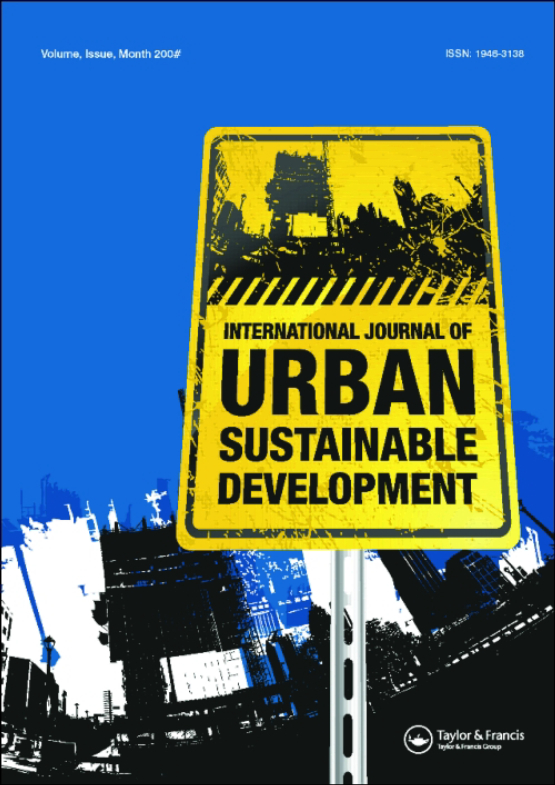Submit a Manuscript to the Journal
International Journal of Urban Sustainable Development
For an Article Collection on
AI for Smarter and Sustainable Cities: Innovations, Challenges and Future Directions
Manuscript deadline


Article collection guest advisor(s)
Mateu Turró,
Universitat Politècnica de Catalunya · Barcelona Tech - UPC
m.turro@upc.edu
Arman Mirzakhani,
Universitat Politècnica de Catalunya · Barcelona Tech – UPC
arman.mirzakhani@upc.edu
AI for Smarter and Sustainable Cities: Innovations, Challenges and Future Directions
Artificial Intelligence (AI) is catalysing a profound transformation in urban management, offering sophisticated solutions to improve sustainability, resilience, and livability. Through better use of information and modelling, AI is redefining the operational dynamics of cities, but also providing new tools for urban planning that are still in their early development phase. As urban areas grapple with the complexities of rapid population growth, climate change, and constrained resources, AI emerges thus as a critical tool for addressing these multifaceted challenges with unprecedented precision and efficiency. The optimization of energy consumption, the enhancement of traffic management systems, the use of predictive climate models for disaster prevention or new mechanisms to better understand citizen needs are among the many issues asking for AI support. This Article Collection endeavours to critically analyse and discuss the most recent advancements in AI applications for the urban system, exploring both its innovative potential and the significant hurdles associated with their application.
As urbanization intensifies and cities grapple with pressing challenges such as housing scarcity, resilience to climate change or increasing socio-economic disparities, the demand for data-driven, intelligent solutions has become increasingly critical to deal with them. AI holds significant promise in satisfying such demand. However, its application raises concerns regarding, for instance, data privacy, algorithmic governance, structural biases or equitable access. A rigorous examination by academics researchers and practitioners of AI’s potential and limitations is necessary to maximize its usefulness while safeguarding the principles of scientific rigour, transparency and accessibility. The articles of this collection should contribute to make AI tools more helpful to plan, design and implement the actions required for a more sustainable urban development.
We invite scholars, researchers, and practitioners to contribute original research and perspectives on AI-driven urban transformation. Topics of interest include, but are not limited to:
- Big data analytics for urban planning
- AI applications in urban governance and citizen participation
- Machine learning for sustainable transportation and mobility
- AI for smart cities (innovations in the urban context)
- AI-powered urban services management
- AI-driven climate adaptation and risk mitigation strategies for urban areas
- Ethical considerations and societal impacts of AI in urban contexts
- Future trends and emerging AI technologies shaping urban sustainability
We welcome submissions of original research articles, case studies, and systematic reviews that align with the scope of the International Journal of Urban Sustainable Development. This Collection offers a unique opportunity for academics and professionals to contribute to the discourse on AI’s role in building smarter and more sustainable cities.
Keywords:
- Artificial Intelligence
- Smart Cities
- Urban Sustainability
- Machine Learning
- Sustainable Development
All manuscripts submitted to this Article Collection will undergo a full peer-review; the Guest Advisor for this Collection will not be handling the manuscripts (unless they are an Editorial Board member).
Please review the journal scope and author submission instructions prior to submitting a manuscript.
The deadline for submitting manuscripts is November 21, 2025.
Please contact Mateu Turró at m.turro@upc.edu and Arman Mirzakhani at arman.mirzakhani@upc.edu with any queries and discount codes regarding this Article Collection.
Prof. Mateu Turró is a prominent scholar in the field of urban planning and development, transport and project appraisal and financing. He has done extensive research on sustainable urban systems, with a focus on urban regeneration and on spatial planning. His later work has focused on innovative technologies and data-driven approaches to enhance the efficiency and resilience of urban environments. With a strong background in both theory and practice, his research uses interdisciplinary methodologies to propose improvements in urban governance and planning, aiming to foster more livable, inclusive and resilient urban spaces. His experience in analysing and financing major investments in urban regeneration and social housing and in public-private partnerships give him a practical approach in the evaluation of urban issues, including on innovative proposals.
Institutional page: https://cenit.es/about/meet-our-team/mateu-turro-calvet/
ORCID page: https://orcid.org/0000-0002-2634-6945
Dr. Arman Mirzakhani is the Executive Director of the Smart City Lab at the Iran University of Science and Technology, where he leads research at the intersection of urban sustainability, smart cities, and advanced computational methodologies. With a strong background in urban regeneration and the revitalization of historical fabrics, his work integrates machine learning algorithms, big data analytics, and socio-economic-environmental modelling to inform sustainable urban development strategies. Dr. Mirzakhani has published extensively on topics such as urban resilience, land-use planning, and the application of emerging technologies in urban management. His contributions are central to the advancement of smart city frameworks, the preservation and adaptive reuse of historic urban areas, and the development of evidence-based solutions for improving urban quality of life. He is also an active collaborator in interdisciplinary research, organizing and participating in academic seminars and international conferences on urban studies, technological innovation, and heritage conservation.
ORCID page: https://orcid.org/0000-0002-3394-2016
Conflict of Interest Disclosure
The Guest Advisors do not have any Conflicts of Interest to disclose.
Benefits of publishing open access within Taylor & Francis
Global marketing and publicity, ensuring your research reaches the people you want it to.
Article Collections bring together the latest research on hot topics from influential researchers across the globe.
Rigorous peer review for every open access article.
Rapid online publication allowing you to share your work quickly.
Submission Instructions
All manuscripts submitted to this Article Collection will undergo desk assessment and peer-review as part of our standard editorial process. Guest Advisors for this collection will not be involved in peer-reviewing manuscripts unless they are an existing member of the Editorial Board. Please review the journal Aims and Scope and author submission instructions prior to submitting a manuscript.
